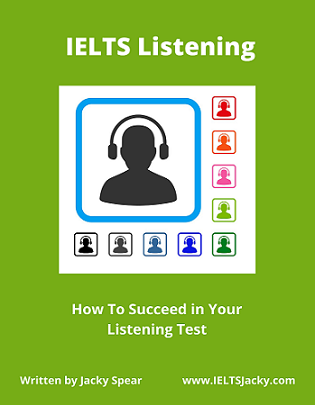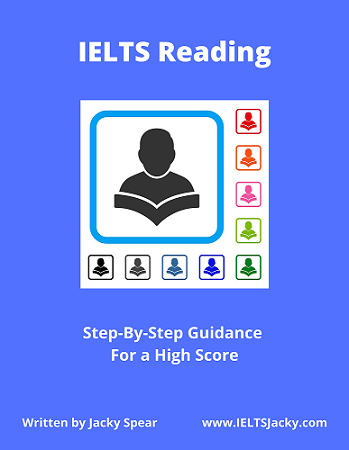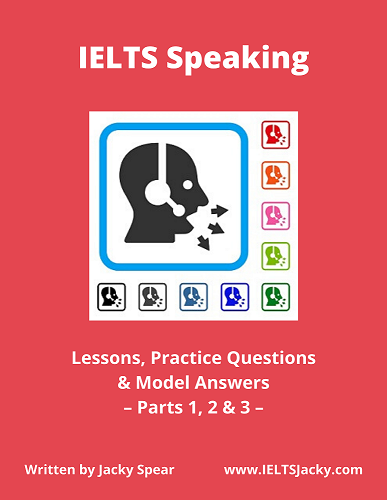IELTS Listening Skills
There are 4 key IELTS listening skills that you need to master to score highly in the test. These are:
|
If you learn and practice these, you will be well prepared for your test.
1) Prediction
Before each recording plays, you will have a short time to read through the question. Try to predict what the answers might be. This will focus your mind on what to listen out for in the recording.
Occasionally, you’ll be able to predict the actual word but mostly it’s one or more of these three things that you’ll be able to determine:
|
Any clues you can get will help you to understand the audio and identify the information needed for the answers.
Here’s a demonstration of how valuable this IELTS listening skill is.
Read this sample question and try to predict the sort of words you would need to listen out for in the recording. Have a go at this for practice before checking my predictions below.
Sample question
|
QUESTIONS: TRANSPORT FROM BAYSWATER
1. Express train leaves at (1) ……………………. 2. Nearest station is (2) ……………………. 3. Number 706 bus goes to (3) ……………………. 4. Number (4) ……………………. bus goes to station
5. Earlier bus leaves at (5) ……………………. Source: British Council website |
|
Predictions: 1. A time 2. A place name 3. A place name or street name 4. A number 5. A time |
You can see that by doing this in the 20-35 seconds you are given before the audio starts, you can get a fairly good idea as to what information you need to know. This will greatly improve your chances of identifying the correct answers.
2) Synonyms & Paraphrasing
Of all the IELTS listening skills, this second one is the most important as it's essential for understanding the recording.
Something you can be certain of is that the spoken text will contain synonyms and paraphrasing of key words and phrases in the questions. So, do not expect to hear the same vocabulary in the recording as is written in the questions.
Here’s an example. The first column of this table contains the question or answer from a past test paper. The second column is a transcript of the sentences in the audio text that contain the answers. I’ve underlined the matching phrases.
Spend a few moments comparing the language to understand how synonyms and paraphrasing have been used.
|
If you’ve studied my Vocabulary lessons, you’ll know that I recommend writing down and learning a couple of common synonyms for every new word you learn. This will help you to quickly build up an extensive and versatile vocabulary.
One of the best ways to practice recognising and using synonyms and paraphrasing is through listening to short videos or podcasts.
This should already be a part of your preparation for the Listening test but add in this exercise. Every so often, pause the recording after an individual sentence and think how you could paraphrase it and what synonyms you could use.
Do this for a few sentences each day and you'll soon see a real improvement in your IELTS listening skills.
Key word technique
A technique you can use in the exam to help you deal with synonyms and paraphrasing is to identify the keywords or phrases in the question and quickly think of synonyms or related words that might come up in the recording.
You’ll only have 20 seconds or so to do this but it could make a huge difference to how well you understand the audio and how successful you are at identifying the answers.
Underline or highlight the key words as I've done in this illustration using a question from a past paper.
|
List of possible answers: A was recently publicised in the media B includes some items given by the artists C includes the most popular exhibits in the museum D has had some of its contents relocated |
Source: Cambridge English Past Paper (edited)
Synonym ideas:
media – newspaper, TV, radio
given – donated
most popular – favourite
relocated – moved
Even if you only have time to think up a couple of synonyms or related words, you’ll find this of benefit as you listen.
3) Recognising Distractors
Another important IELTS listening skill is the ability to recognise distractors. These are words or phrases used by a speaker to qualify something or to correct themselves or another speaker.
In the recording, a piece of information may be given and then corrected or changed. If you’re not listening carefully, you’ll think that the first piece of information is the answer when it is the second detail that is the correct answer.
Distractors are common in the listening test and are intended to try and catch you out.
Here are some examples of sentences containing distractors.
|
Listen for words or phrases like these and don’t be tricked by them. Listen to all the details before choosing your answer.
4) Connected Speech
The final of our four IELTS listening skills is something that most students struggle with to some degree or another – connected speech.
Connected speech is when the words and sounds in a sentence run into each other making it difficult for a non-native speaker to understand what is being said.
In these three examples, you can see a sentence followed by how it might sound to the listener.
|
Do you want to go to the park? à Dya wanna getethe park? His son lent him ten bucks à Hison lent im tembucks. I have to visit my grandma à Ivte visit me gramme. |
There's no easy way to overcome the challenge of connected speech apart from listening to lots of native speakers speaking at a normal rate.
Podcasts are ideal for this as you can pause them and listen to confusing sentences over and over again until you fully understand what is being said. You’ll be surprised at how quickly you tune into the fast-paced speech with regular practice.
This is an excellent exercise to do on a regular basis and will quickly improve your listening skills. There are podcasts on hundreds of different topics so you’ll easily find ones that interest you or are relevant to the IELTS exam, so make it a daily exercise.
Whilst these are the 4 key IELTS listening skills, I have some other skills to teach you that will save you from making unnecessary errors in the test. Learn about them in this lesson: IELTS Listening Exercises
Want to watch & listen to this lesson on IELTS Listening skills?
Click on this video.
IELTS Listening – All Lessons
There are examples of how to use these IELTS listening skills in many of the lessons below.
IELTS Listening Test – Understand the format & question types. Know what skills are assessed. Also, discover 3 important marking tips.
Listening Strategies – Learn 3 essential listening strategies – question analysis, answer prediction & how to use keyword clues.
Listening Skills – Learn the 4 key listening skills needed for a high score highly. Examples from real questions.
Listening Exercises – 8 listening exercises to help you recognise & learn vocabulary for 6 common topics – time, numbers, prices, dates, letter names & addresses.
The 10 Question Types – Examples of all 10 types of Listening questions. Learn how to recognise & understand them. Links to 10 step-by-step lessons.
Listening Tips – Top 10 tips to bring you success in your Listening test. Essential information you need to know to achieve a high score.
How to Improve Your Listening Skills – 6 simple strategies essential for achieving a high score in the test.
Listening Practice – 4 practice techniques to develop your listening skills
Map & Plan Vocabulary – Learn the vocabulary you need for your test. 5 maps & plans with sample sentences containing common vocabulary of location & direction.
Listening Practice Samples – Short activities to improve your listening skills & help you learn topic vocabulary.
Genuine Full Practice Tests:
The 10 Question Types
Click the links below to learn how to answer each type of question.







